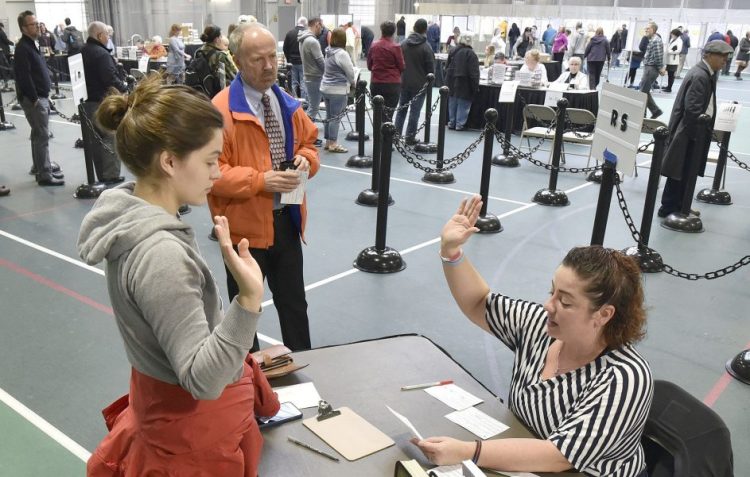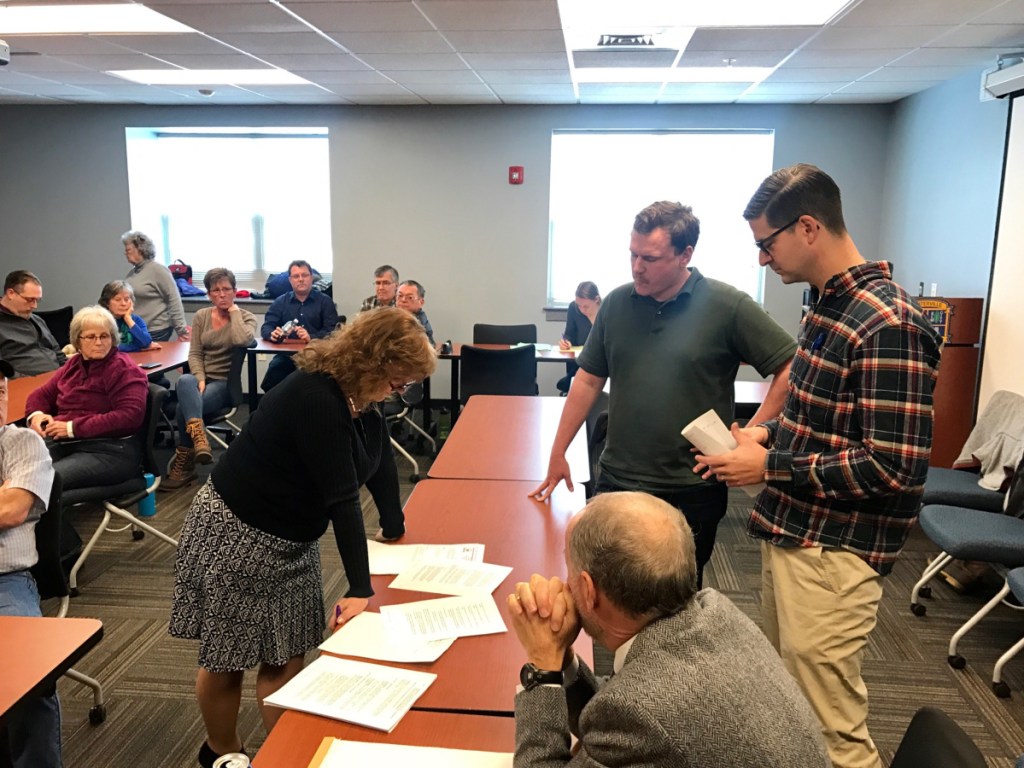WATERVILLE — The Maine Supreme Judicial Court has set a preliminary timeline for looking at a dispute over the results of a controversial referendum banning plastic shopping bags that involves more than 160 challenged ballots belonging to Colby College students.
The case, which is just the second instance in Maine of a municipal election being sent to the Supreme Court, is unusual because of the large number of challenged ballots it involves and the fact the challenged ballots ultimately could determine the outcome of the vote.
“You could ask 20 Maine lawyers for their opinion, and the odds are 20 out of 20 would say they’ve never had this issue before,” Waterville City Solicitor Bill Lee said. “It’s a very unusual fact pattern and there’s certainly no law (around how to proceed) involving municipal decisions.”
With the preliminary timeline set, there’s still little indication of how the case might turn out and whether Waterville will end up banning plastic bags.
FEW MAINE PRECEDENTS
Lee, who is the town attorney in neighboring Winslow, last year handled for that community the state’s only other instance of a municipal election sent to the Supreme Court. The case involved a disputed ballot that the court ultimately threw out because the voter’s intent could not be determined.
Last month’s recount requested by Mayor Nick Isgro flipped the results of the referendum approved by voters in November to ban plastic shopping bags at retail stores of 10,000 square feet or more.
The results of the recount did not include 164 challenged ballots, all but two of which were challenged by a group of Waterville voters on grounds that Colby College students registered to vote improperly by using mailing addresses rather than physical addresses.
Lee said he has not researched the issue on a state level to see if there is any precedent for how the court might address a large number of challenged ballots. A challenged ballot involves questions about a voter’s qualifications, whereas a disputed ballot usually is called into question for the manner in which the ballot is marked.
Students who did not register properly were given the chance on Election Day and earlier this month to go to the city clerk’s office and correct their registrations, but Lee said there is no telling how a judge might view their ballots and whether the ballots would be allowed to count if the faulty registrations were an honest mistake.
“It’s an obscure area of law,” Lee said. “I think it’s unlikely you would have enough challenged ballots at a state level, where there are often thousands of voters, to impact an election.”
WHAT DO EXPERTS SAY?
Several legal and political experts, including professors at the University of Maine, in Orono; the University of Maine at Farmington; and Colby College declined to comment, saying they did not have enough expertise on the issues.
Dmitry Bam, a constitutional law professor at the University of Maine School of Law, said the case could go either way.
“Courts have upheld reasonable registration requirements, so if the students failed to comply with those requirements, I believe it is within the court’s power to declare those ballots invalid,” Bam said in an email.
“On the other hand, there is some precedent to permit voters to remedy technical violations even after their ballot has been cast — most recently, we saw this in Florida with the mismatched signature on mail-in ballots.”
In the Florida case, a federal judge recently ruled to allow voters to fix vote-by-mail and provisional ballots that were called into question because signatures on the ballots did not appear to match the signatures elections officials had on file.
RULING WEEKS AWAY
Either way, a resolution in the Waterville case is not expected until late February at the earliest. Before the recount, the bag ban had been scheduled to go into effect April 22, which is Earth Day.
An order dated Wednesday and signed by Chief Justice Leigh Saufley states that City Clerk Patti Dubois is to scan or photograph information related to the case immediately, including the challenged ballots, disputed ballots, any pertinent affidavits or certificates, and the voter registration documents for each voter whose ballot was challenged.
The information must be submitted to the court by Jan. 11, after which interested parties will have one week to alert the court to any concerns over the accuracy of the documents.
The parties have until Jan. 28 to submit in writing a paper addressing the disputed ballots, challenged ballots, the specifics regarding the process by which the ballots were challenged and whether the issues presented to the court are of legal concern.
MAYOR, ACTIVISTS AT ODDS
Isgro, who paid the city a $250 deposit to conduct the recount, posted a copy of the order on his mayoral Facebook page Friday, referring to the Colby students as “illegally registered persons.”
“While our side does not have the expensive attorneys from Portland and deep pockets, we will be working to file a court brief by the requested date in order to assure that the will of the Waterville residents that was ratified by the Waterville City Council is honored!” he wrote.
Todd Martin, a member of the Sustain Mid-Maine Coalition, the group that initiated the referendum as part of an environmental sustainability effort, said that group also will be filing a brief.
Martin is represented by Russell Pierce, a Portland attorney who has agreed to take the case pro bono, he said, responding to the mayor’s statement that the group has “expensive attorneys from Portland and deep pockets.”
“We will definitely be filing a brief, and the arguments we will use are that these 164 challenged ballots belong to voters who were registered to vote and whose registrations were approved by the city clerk,” Martin said. “The clerk already certified them as legal voters in Waterville.”
Dubois, the city clerk, said 77 of the 164 voters whose ballots were challenged have gone to City Hall to update their registrations.
“We feel confident that as long as those 70-plus students were able to prove their residency, their votes should be allowed to count, and we feel confident we will win,” Martin said.
The bag ban originally passed 3,052-2,906 on Election Day, though the results were reversed by a seven-vote margin Nov. 16. If it is upheld by the Supreme Court, Waterville will join 18 other communities around the state that already have bans, fees or restrictions on plastic bags, according to the Natural Resources Council of Maine.
Rachel Ohm — 612-2368
Twitter: @rachel_ohm
Send questions/comments to the editors.





Comments are no longer available on this story